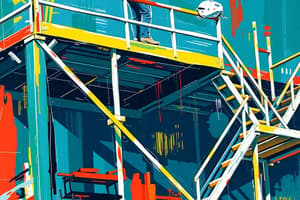Podcast
Questions and Answers
What is the primary function of the temporary intermediate short-lift deck?
What is the primary function of the temporary intermediate short-lift deck?
- To allow scaffolders to access the next 1m level with guardrails in place (correct)
- To support heavy loads
- To provide a permanent working platform
- To serve as a debris chute
What is the maximum conventional lift height for which the short-lift system is suitable?
What is the maximum conventional lift height for which the short-lift system is suitable?
- 2.5m
- 3.0m
- 1.5m
- 2.1m (correct)
What is the purpose of the goal post frame in the Advanced Guardrail System (AGS)?
What is the purpose of the goal post frame in the Advanced Guardrail System (AGS)?
- To support heavy loads
- To form a goal post frame with upright tubes and a single tube as a temporary guardrail (correct)
- To create a temporary edge protection
- To provide a permanent guardrail
What is the correct positioning of the second right-angle coupler in the Advanced Guardrail System (AGS)?
What is the correct positioning of the second right-angle coupler in the Advanced Guardrail System (AGS)?
What is the primary purpose of the collective fall protection system?
What is the primary purpose of the collective fall protection system?
What is the function of the temporary edge protection in the short-lift system?
What is the function of the temporary edge protection in the short-lift system?
What is the purpose of the guardrail system in the Advanced Guardrail System (AGS)?
What is the purpose of the guardrail system in the Advanced Guardrail System (AGS)?
What is the advantage of using system decking in the short-lift system?
What is the advantage of using system decking in the short-lift system?
At what distance from an unprotected edge should the right-angle couplers be secured?
At what distance from an unprotected edge should the right-angle couplers be secured?
What is the primary purpose of the Advanced Guardrail System (AGS)?
What is the primary purpose of the Advanced Guardrail System (AGS)?
What is the purpose of the additional guardrail in the base lift?
What is the purpose of the additional guardrail in the base lift?
In what direction should the tube be pushed in STEP 3?
In what direction should the tube be pushed in STEP 3?
How can scaffolders access the platform and erect the next lift with collective protection?
How can scaffolders access the platform and erect the next lift with collective protection?
What is the maximum distance the tube should be pushed out in STEP 3?
What is the maximum distance the tube should be pushed out in STEP 3?
What should be done before scaffolders can leave the established safe zone?
What should be done before scaffolders can leave the established safe zone?
What is the recommended method to release the guardrail to the next level?
What is the recommended method to release the guardrail to the next level?
What is the purpose of swivel couplers in parallel?
What is the purpose of swivel couplers in parallel?
What is the purpose of the temporary guardrail in the Advanced Guardrail System?
What is the purpose of the temporary guardrail in the Advanced Guardrail System?
What is crucial in ensuring the advanced guardrail is raised before installing transoms or other protrusions?
What is crucial in ensuring the advanced guardrail is raised before installing transoms or other protrusions?
What should be taken at stop-ends or corner returns?
What should be taken at stop-ends or corner returns?
What should be done if the facade bracing is obstructing the advanced guardrail?
What should be done if the facade bracing is obstructing the advanced guardrail?
What is the final step in the process of installing a tube and fitting an advanced guardrail horizontally?
What is the final step in the process of installing a tube and fitting an advanced guardrail horizontally?
What is a characteristic of the advanced guardrail system?
What is a characteristic of the advanced guardrail system?
What is the primary purpose of the collective fall protection system?
What is the primary purpose of the collective fall protection system?
Flashcards are hidden until you start studying
Study Notes
Collective Fall Protection
- An additional guardrail is needed for the base lift only to protect the vertical tube.
- Couplers can be secured to secure the advanced guardrail, allowing scaffolders to access the platform and erect the next lift with collective protection.
- The advanced guardrail can be raised to the next level once the permanent guardrails have been installed.
- Swivel couplers in parallel can be used to fix the advanced guardrail for stop-end guardrails, preventing scaffolders from encroaching within 1m of the leading edge.
Advanced Guardrail System (AGS)
- The AGS is a tube and fitting frame type that functions similarly to proprietary systems but is made using standard scaffolding components.
- The AGS is designed for independent tied scaffolding, forming a temporary guardrail from within a scaffolder's safe zone.
- The AGS provides protection to both inside and outside faces of the scaffold, fixing to the standards.
Erecting AGS
- STEP 1: Determine the scaffold elevation and bay sizes by selecting tubes that fit the length and size of the bay.
- STEP 2: Create a goal post frame by placing tubes on the ground and attaching a guardrail to the upright tubes using right-angle couplers (EN74).
- STEP 3: Attach a second right-angle coupler to each upright tube, 1100mm down from the top coupler's center, ensuring they are 'up-side-down' and on the opposite side of the tube.
- STEP 4: Two scaffolders are needed to lift the frame and secure it to the ledger.
- STEP 5: Couplers can be secured to secure the advanced guardrail, allowing scaffolders to access the platform and erect the next lift with collective protection.
- STEP 6: The advanced guardrail can be raised to the next level once the permanent guardrails have been installed.
Tube and Fitting Horizontal Type AGS
- STEP 1: Secure two right-angle couplers to the existing guardrail standards, ensuring they clip on before encroaching within 1m of an unprotected edge.
- STEP 2: Place a temporary guardrail using another tube loosely into two fittings to ensure horizontal tube sliding.
- STEP 3: Push the tube out horizontally past the next standard (one bay max) and tighten the end coupler.
- STEP 4: Now walk out to fix the temporary guardrail to the standard, clipping on until the guardrail is secured and if encroaching within 1m of the end.
- STEP 5: The working platform guardrail(s) can now be completed and next lift constructed with the scaffolders' safe zone in place.
- STEP 6: The temporary guardrail can then be released and slid along horizontally to the next bay.
Studying That Suits You
Use AI to generate personalized quizzes and flashcards to suit your learning preferences.




